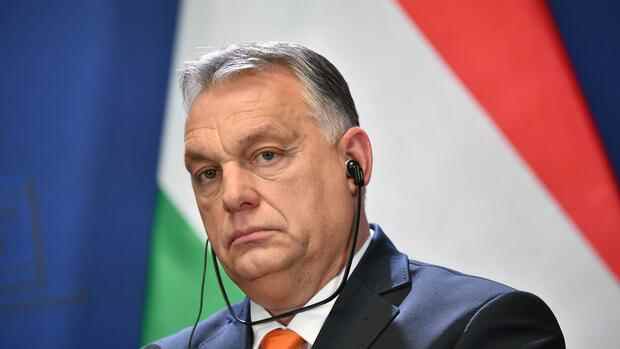Hungary’s prime minister is again weakening the country’s democratic mechanisms.
(Photo: dpa)
Budapest Hungary’s right-wing Prime Minister Viktor Orban alone decides on practically all important issues in his country. Not only does it depend on which bills reach parliament. The place for investments, the rise and fall of careers, the allocation and withdrawal of benefices – all of this ultimately passes through his desk.
Given the abundance of power, it is surprising at first glance that Orban’s first official act after his new government was sworn in was to declare a state of emergency. It went in quick succession. On Tuesday, Parliament first created the basis for this by amending the constitution – with the creation of the “state of emergency due to an armed conflict, a war situation or a humanitarian catastrophe in a neighboring country”.
Shortly before midnight, the Hungarian Official Gazette announced the new state of emergency. It came into effect at midnight on Wednesday. Ukraine, against which Russia has been at war for three months, borders directly on Hungary.
In a Facebook video, Prime Minister Viktor Orban justified the step by saying that the conflict in the neighboring country is a constant threat “to our physical security, to the energy supply and the financial security of families and the economy”. Therefore, the government must be able to react quickly to protect the population.
Top jobs of the day
Find the best jobs now and
be notified by email.
>> Read also: The US wants to dissuade the EU from its previous plan of an oil embargo against Russia
Orban said the war and EU sanctions had “resulted in an enormous economic mess and drastic price hikes”. In fact, inflation reached 9.5 percent in April, the highest level since 2001. However, inflation has been rising sharply for the past year, which, among other things, prompted Budapest to introduce price caps for fuel in late autumn.
The Ukraine war has strengthened them again. However, Orban fears that this is just the beginning of a more massive crisis.
Foreign policy tightrope walk
Since Hungary has made itself almost totally dependent on Russian energy under the politician who has been in power without interruption since 2010, the consequences of the economic war between the EU and Russia are particularly feared. Orban therefore only supports sanctions outside the energy sector. He has been blocking an oil embargo for weeks, with no change of course in sight despite great pressure and financial promises from Brussels.
The environmental organization calls on Orban to take part in an oil boycott against Russia.
(Photo: IMAGO/Eastnews)
Budapest’s Ukraine policy is walking an increasingly fine line, with the aim of not angering either Moscow or the NATO allies in the long term. It took Orban more than five weeks to describe Putin as an aggressor.
Not only in his electorate, but also in intellectual circles close to Fidesz, there is considerable sympathy for Russia, mixed with aversion to the USA. The promise to keep Hungary out of the conflict was a crucial factor in Orban’s renewed election victory in early April.
For the same reason, his government has always said it would limit aid to Ukraine to the humanitarian sphere and prevent arms shipments through Hungarian territory or through its airspace. However, according to the Atlatszo website, Budapest has tacitly admitted such in at least fifty cases. In March, Hungary also approved the stationing of a NATO combat force on its own territory.
More domestic political powers
Orban wants to explain on Wednesday what additional domestic political powers the government is creating as a result of the state of emergency. It is clear that his fifth government, which was sworn in on Tuesday and again has a two-thirds majority in parliament, can now make regulations that selectively suspend the usual legal framework.
He also created the basis for this new form of emergency on Tuesday with a constitutional amendment. It is based on the state of emergency caused by Corona, which has been in effect since spring 2020. It is due to expire at the end of the month, according to the prime minister’s office.
With agency material.
More: The war brought Europe together – now the first cracks are appearing
